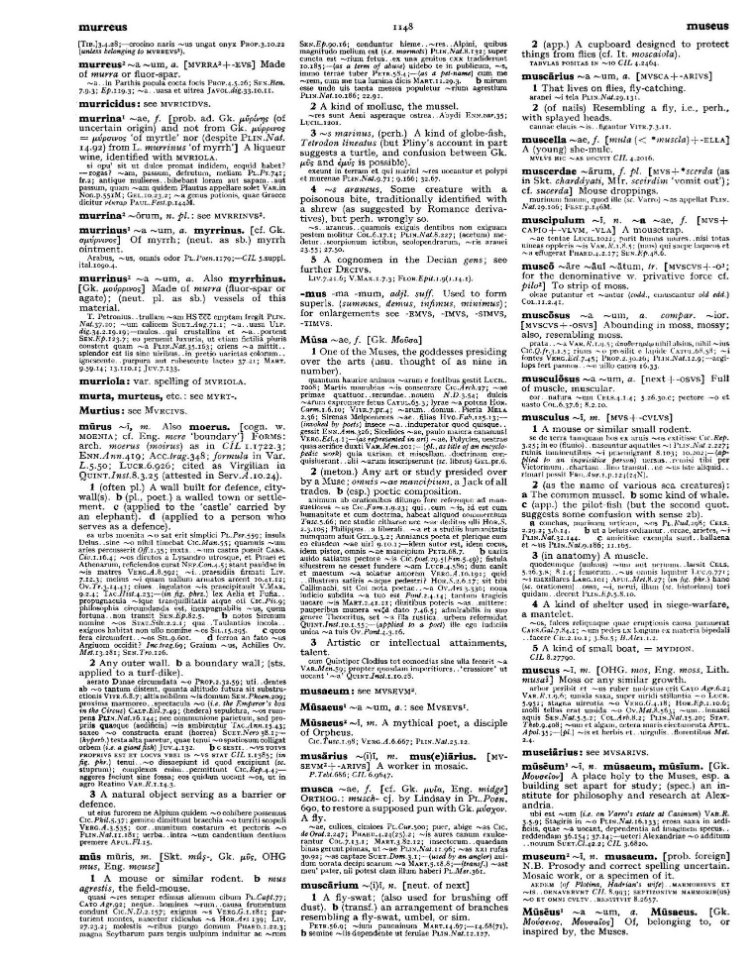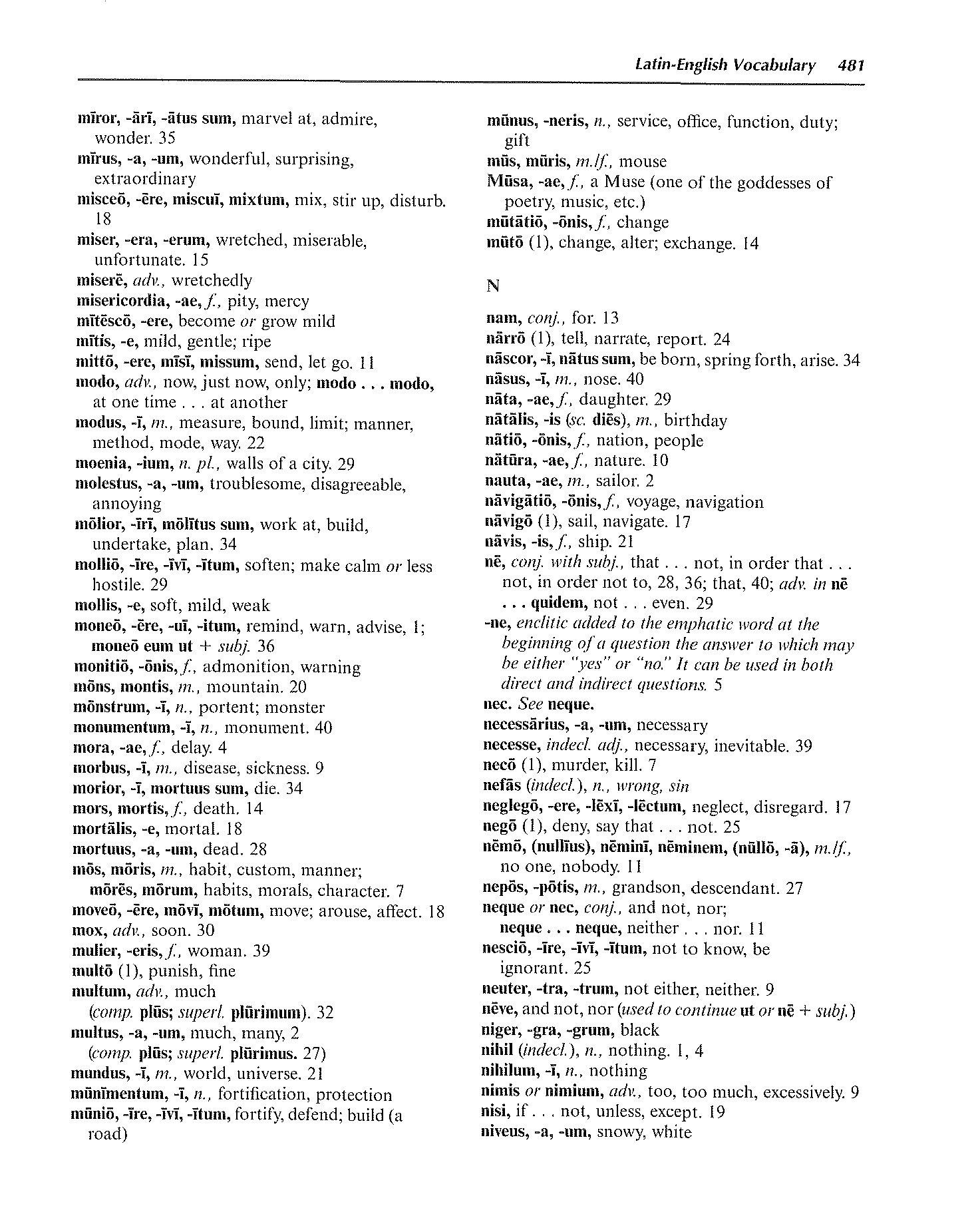
page_listing.tpl
page_subListingDetails.tpl
sub_listingDetails_style1.tpl
sub_listingDetails.title.tpl
mūsa muse
mūsa is a Latin Noun that primarily means muse.
Definitions for mūsa
Wheelock's Latin
Noun
- 1
A Muse (one of the goddesses of poetry, music, etc.)
Oxford Latin Dictionary
Noun
- 1
One of the Muses, the goddesses presiding over the arts (usu. thought of as nine in number).
- 2
(meton.) Any art or study presided over by a Muse; omnis ~ae mancipium, a Jack of all trades. (b) (esp.) poetic composition.
- 3
Artistic or intellectual attainments, talent.
Sentences with mūsa
Latin to English
Odi profanum vulgus et arceo; favete linguis. Carmina non prius audita Musarum sacerdos virginibus puerisque canto.Compare I hate the uninitiated crowd and bid them avaunt. Listen all in silence! Strains unheard before I, the Muses' hierophant, now chant to maidens and to boys.
Iuvat integros accedere fontis atque haurire, iuvatque novos decerpere flores insignemque meo capiti petere inde coronam unde prius nulli velarint tempora musae; primum quod magnis doceo de rebus et artis religionum animum nodis exsolvere pergo, deinde quod obscura de re tam lucida pango carmina, musaeo contingens cuncta lepore.Compare I love to approach virgin springs and there to drink: I love to pluck fresh flowers, and to seek an illustrious chaplet for my head from fields whence ere this the Muses have crowned the brows of none; first because my teaching is of high matters, and I proceed to unloose the mind from the close knots of religion; next because the subject is so dark and the lines I write so clear, as I touch all with the Muses's grace.
Convivarum numerum incipere oportere a Gratiarum numero et progredi ad Musarum, id est profisci a tribus et consistere in novem.Compare The number of guests at dinner should not be less than the number of Graces nor exceed that of the Muses, i.e., it should begin with three and stop at nine.
Declension table for mūsa
Cactus2000
| Singular | Plural | |
| Nom. | mūsa | mūsae |
| Gen. | mūsae | mūsārum |
| Dat. | mūsae | mūsīs |
| Acc. | mūsam | mūsās |
| Abl. | mūsā | mūsīs |
Data sources
Notes
- Definitions
- Frederick M. Wheelock, Wheelock's Latin, 6th ed., rev. Richard A. LaFleur (New York, NY: HarperCollins Publishers, 2005): 481.
- P. G. W. Glare, Oxford Latin Dictionary, Vols. 1-8 (Oxford: Clarendon Press, 1982): 1148.
- Word frequencies
- Paul B. Diederich, The Frequency of Latin Words and Their Endings, PhD diss., (Columbia University, 1939).
Bibliography
Allen, Joseph H. Allen and Greenough's New Latin Grammar for Schools and Colleges: Founded on Comparative Grammar. Edited by James B. Greenough, George L. Kittredge, Albert A. Howard, and Benjamin L. D'Ooge. Boston, MA: Ginn & Company, 1903.
Crystal, David. A Dictionary of Linguistics and Phonetics. 6th ed. Oxford, UK: Blackwell Publishing, 2008.
Delatte, Louis, Suzanne Govaerts, Joseph Denooz, and Etienne Evrard. Dictionnaire fréquentiel et index inverse de la langue latine [Frequency Dictionary and Inverse Index of the Latin Language]. Liège, Belgium: Laboratoire d'analyse statistique des langues anciennes de l'Université de Liège (L.A.S.L.A.), 1981.
Diederich, Paul B. The Frequency of Latin Words and Their Endings. PhD diss., Columbia University, 1939.
Francese, Christopher. "Latin Core Vocabulary." Dickinson College Commentaries. Last modified 2014. http://dcc.dickinson.edu/latin-vocabulary-list.
Gildersleeve, Basil L., and Gonzales Lodge. Gildersleeve's Latin Grammar: Third Edition, Revised, and Enlarged. 3rd ed. London, England: Macmillan and Co., 1903.
Glare, Peter G.W. Oxford Latin Dictionary. Vols. 1-8. Oxford, England: Clarendon Press, 1982.
Krüger, Bernd. "Latin Conjugation Tables." Cactus2000. Accessed May 5, 2023. https://latin.cactus2000.de/index.en.php.
Pierson, Nick. "Sound of Text." Accessed October 26, 2019. https://soundoftext.com.
Wheelock, Frederick M. Wheelock's Latin. 6th ed. Revised by Richard A. LaFleur. New York, NY: HarperCollins Publishers, 2005.
Wiktionary Contributors. "Victionarium." Wikimedia Foundation, Inc. Updated March 18, 2019. https://la.wiktionary.org/wiki/Victionarium:Pagina_prima.
Citation
Chicago (17th ed.)
Allo Contributors. "Mūsa, Mūsae (n.) - Latin Word Definition." Allo Latin Dictionary. Last modified . Accessed February 20, 2026. http://ancientlanguages.org/latin/dictionary/musa-musae.
Entry created on . Last updated on .







